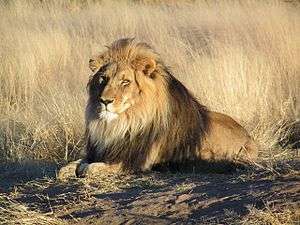lion
English

Alternative forms
- lyon (obsolete)
Etymology
From Middle English lyoun, lion, leon, borrowed from Old French lion, from Latin leō, (accusative: leōnem), from Ancient Greek λέων (léōn). Some argue that it is a borrowing from a Semitic language; however evidence is not clear and the relation with Proto-Semitic *labiʾ- is not solid. Semitic "labi/lavi" could either be a parent term to the Greek one or both could have evolved independently from a now lost root. Many ancient languages possessed similar words for lion, including Akkadian 𒌨 (labbu). It is unclear as to who borrowed the word from whom, though the ultimate source is likely non-Indo-European.
Pronunciation
- enPR: lī'ən, IPA(key): /ˈlaɪən/
Audio (US) (file) Audio (file) - Rhymes: -aɪən
Noun
lion (plural lions or lion, feminine lioness)
- A big cat, Panthera leo, native to Africa, India and formerly to much of Europe. The term may apply to the species as a whole, to individuals, or to male individuals. It also applies to related species like mountain lions.
- Tigers and lions share a common ancestor from a few million years ago.
- 1590, Edmund Spenser, The Faerie Qveene. […], London: Printed [by John Wolfe] for VVilliam Ponsonbie, OCLC 960102938, book II, canto IX, stanza 14, page 311:
- For with ſuch puiſſance and impetuous maine / Thoſe Champions broke on them, that forſt the fly, / Like ſcattered Sheepe, whenas the Shepherds ſwaine / A Lyon and a Tigre doth eſpye, / With greedy pace forth ruſhing from the foreſt nye.
- A male lion.
- (heraldry) A stylized representation of a large cat, used on a coat of arms.
- A Chinese foo dog.
- An individual who shows strength and courage, attributes associated with the lion.
- 2003, Peter Armstrong and Angus McBride, Stirling Bridge & Falkirk 1297–98: William Wallace's Rebellion:
- It was said of [Edward Plantaganet] that 'he was a lion for pride and ferocity but a pard for inconstancy and changeableness, not keeping his word or promise but excusing himself with fair words'.
- 2003, Peter Armstrong and Angus McBride, Stirling Bridge & Falkirk 1297–98: William Wallace's Rebellion:
- A famous person regarded with interest and curiosity.
- Prof. Wilson
- Such society was far more enjoyable than that of Edinburgh, for here he was not a lion, but a man.
- 1919, W. Somerset Maugham, The Moon and Sixpence, ch. 4
- Rose Waterford was a cynic. She looked upon life as an opportunity for writing novels and the public as her raw material. Now and then she invited members of it to her house if they showed an appreciation of her talent and entertained with proper lavishness. She held their weakness for lions in good-humoured contempt, but played to them her part of the distinguished woman of letters with decorum.
- Prof. Wilson
- A light brown color that resembles the fur of a lion. (Can we add an example for this sense?)
- lion colour:
- (historical) An old Scottish coin, with a lion on the obverse, worth 74 shillings.
Holonyms
- (individual Panthera leo): pride
Coordinate terms
Derived terms
- antlion, ant lion
- aphid lion, aphis lion
- beard the lion
- Cape lion
- cave lion
- dandelion
- golden lion tamarin
- Lion of Judah
- Lion of St Mark
- Lion of Venice
- lion's ear
- lion's foot
- lion's leaf
- lion's share
- lion's tail
- lion's tooth
- lion cub
- lioness
- lionfish
- Lionheart
- lionhearted, lion-hearted
- lionhood
- lionise, lionize
- lionish
- lionism
- lionlike
- lionling
- lionly
- lionship
- marsupial lion
- mountain lion
- Nemean lion
- sea lion
- Steller's sea lion
- twist the lion's tail
Related terms
Translations
|
|
Adjective
lion (not comparable)
- Of the light brown color that resembles the fur of a lion.
See also



- Appendix:Animals
- Appendix:English collective nouns
French
Etymology
From Old French lion, a semi-learned borrowing from Latin leō, leōnem, from Ancient Greek λέων (léōn).
Pronunciation
- IPA(key): /ljɔ̃/
audio (file) - Rhymes: -ɔ̃
- Homophone: Lyon
Noun
Further reading
- “lion” in le Trésor de la langue française informatisé (The Digitized Treasury of the French Language).
Old French
Etymology
Semi-learned borrowing from Latin leō, leōnem, derived from Ancient Greek λέων (léōn).